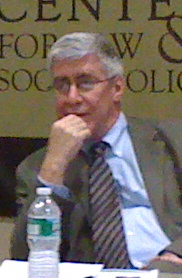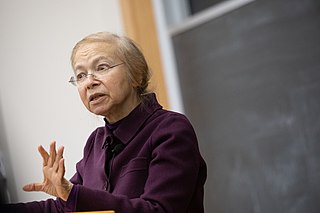Related Research Articles

Derek Antony Parfit was a British philosopher who specialised in personal identity, rationality, and ethics. He is widely considered one of the most important and influential moral philosophers of the late 20th and early 21st centuries.

Thomas Nagel is an American philosopher. He is the University Professor of Philosophy and Law Emeritus at New York University, where he taught from 1980 to 2016. His main areas of philosophical interest are legal philosophy, political philosophy, and ethics.

Ronald Myles Dworkin was an American legal philosopher, jurist, and scholar of United States constitutional law. At the time of his death, he was Frank Henry Sommer Professor of Law and Philosophy at New York University and Professor of Jurisprudence at University College London. Dworkin had taught previously at Yale Law School and the University of Oxford, where he was the Professor of Jurisprudence, successor to philosopher H.L.A. Hart. An influential contributor to both philosophy of law and political philosophy, Dworkin received the 2007 Holberg International Memorial Prize in the Humanities for "his pioneering scholarly work" of "worldwide impact." According to a survey in The Journal of Legal Studies, Dworkin was the second most-cited American legal scholar of the twentieth century. After his death, the Harvard legal scholar Cass Sunstein said Dworkin was "one of the most important legal philosophers of the last 100 years. He may well head the list."

David Kellogg Lewis was an American philosopher who is widely regarded as one of the most important philosophers of the 20th century. Lewis taught briefly at UCLA and then at Princeton University from 1970 until his death. He is closely associated with Australia, whose philosophical community he visited almost annually for more than 30 years.
Galen John Strawson is a British analytic philosopher and literary critic who works primarily on philosophy of mind, metaphysics, John Locke, David Hume, Immanuel Kant and Friedrich Nietzsche. He has been a consultant editor at The Times Literary Supplement for many years, and a regular book reviewer for The Observer, The Sunday Times, The Independent, the Financial Times and The Guardian. He is the son of philosopher P. F. Strawson. He holds a chair in the Department of Philosophy at the University of Texas, Austin, and taught for many years before that at the University of Reading, City University of New York, and Oxford University.

Kwame Akroma-Ampim Kusi Anthony Appiah is a British American philosopher and writer who has written about political philosophy, ethics, the philosophy of language and mind, and African intellectual history. Appiah was the Laurance S. Rockefeller University Professor of Philosophy at Princeton University, before moving to New York University (NYU) in 2014. He holds an appointment at the NYU Department of Philosophy and NYU's School of Law. Appiah was elected President of the American Academy of Arts and Letters in January 2022.
Phædo or Phaedo, also known to ancient readers as On The Soul, is one of the best-known dialogues of Plato's middle period, along with the Republic and the Symposium. The philosophical subject of the dialogue is the immortality of the soul. It is set in the last hours prior to the death of Socrates, and is Plato's fourth and last dialogue to detail the philosopher's final days, following Euthyphro, Apology, and Crito.
Hartry H. Field is an American philosopher. He is Silver Professor of Philosophy at New York University; he is a notable contributor to philosophy of science, philosophy of mathematics, epistemology, and philosophy of mind.
Peter van Inwagen is an American analytic philosopher and the John Cardinal O'Hara Professor of Philosophy at the University of Notre Dame. He is also a research professor of philosophy at Duke University each spring. He previously taught at Syracuse University, earning his PhD from the University of Rochester in 1969 under the direction of Richard Taylor. Van Inwagen is one of the leading figures in contemporary metaphysics, philosophy of religion, and philosophy of action. He was the president of the Society of Christian Philosophers from 2010 to 2013.

Jeremy Waldron is a New Zealand professor of law and philosophy. He holds a University Professorship at the New York University School of Law, is affiliated with the New York University Department of Philosophy, and was formerly the Chichele Professor of Social and Political Theory at All Souls College, Oxford University. Waldron also holds an adjunct professorship at Victoria University of Wellington. Waldron is regarded as one of the world's leading legal and political philosophers.
Robert Culp Stalnaker is an American philosopher who is Laurance S. Rockefeller Professor Emeritus of Philosophy at the Massachusetts Institute of Technology. He is a Fellow of the American Academy of Arts and Sciences and a Corresponding Fellow of the British Academy.

Frances Myrna Kamm is an American philosopher specializing in normative and applied ethics. Kamm is currently the Henry Rutgers University Professor of Philosophy and Distinguished Professor of Philosophy at Rutgers University in New Brunswick, New Jersey. She is also the Littauer Professor of Philosophy and Public Policy Emerita at Harvard University's John F. Kennedy School of Government, as well as Professor Emerita in the Department of Philosophy at New York University.

R. Jay Wallace is a Professor of Philosophy and Judy Chandler Webb Distinguished Chair for Innovative Teaching and Research at the University of California, Berkeley. His areas of specialization include moral philosophy and philosophy of action. He is most noted for his work on practical reason, moral psychology, and meta-ethics.
J. David Velleman is an American philosopher. He is Emeritus Professor of Philosophy and Bioethics at New York University and Miller Research Professor of Philosophy at Johns Hopkins University. He primarily works in the areas of ethics, moral psychology, and related areas such as the philosophy of action, and practical reasoning.

Barry Stroud was a Canadian philosopher and professor at the University of California, Berkeley. Known especially for his work on philosophical skepticism, he wrote about David Hume, Ludwig Wittgenstein, the metaphysics of color, and many other topics.
Stephen Schiffer is an American philosopher and currently Silver Professor of Philosophy at New York University. He is a specialist in the philosophy of language.

Sally Haslanger is an American philosopher and professor. She is the Ford Professor of Philosophy in the Department of Linguistics and Philosophy at the Massachusetts Institute of Technology. She held the 2015 Spinoza Chair of Philosophy at the University of Amsterdam.
Rae Helen Langton, FBA is an Australian-British professor of philosophy. She is currently the Knightbridge Professor of Philosophy at the University of Cambridge. She has published widely on Immanuel Kant's philosophy, moral philosophy, political philosophy, metaphysics, and feminist philosophy. She is also well known for her work on pornography and objectification.
Béatrice Longuenesse is a French philosopher and academic, who is the Silver Professor of Philosophy Emerita at New York University. Her work focuses on Immanuel Kant, Georg Wilhelm Friedrich Hegel, and the philosophy of mind. She is a fellow of the American Academy of Arts and Sciences. Longuenesse is one of the most prominent living Kant scholars, and her works have generated significant discussion around parts of Kant's corpus that were previously largely overlooked.

The New York University Department of Philosophy is ranked 1st in the US and 1st in the English-speaking world as of the most recent edition of the Philosophical Gourmet Report from 2021. It is also ranked 1st in the world by the 2023 QS World University Rankings, and is internationally renowned. It has particular strengths in epistemology, history of philosophy, logic, metaphysics, moral and political philosophy, philosophy of language, philosophy of logic and philosophy of mathematics, and philosophy of mind. The department offers B.A., M.A., and Ph.D. degrees in philosophy, as well as a minor in philosophy and a joint major in language and mind with the NYU Departments of Linguistics and Psychology. It is home to the New York Institute of Philosophy, a research center that supports multi-year projects, public lectures, conferences, and workshops in the field, as well as outreach programs to teach New York City high school students interested in philosophy.
References
- ↑ "Samuel Scheffler, Faculty of Philosophy - NYU". nyu.edu.
- ↑ "Faculty Profile - Samuel Scheffler".
- ↑ "Samuel Scheffler". berkeley.edu.
- ↑ "Press Releases - American Academy of Arts & Sciences". amacad.org.
- ↑ "Utenlandske medlemmer" (in Norwegian). Norwegian Academy of Science and Letters . Retrieved 4 July 2021.
- ↑ "Is Life a Ponzi Scheme?". bostonreview.net.
- ↑ ENR // AgencyND // University of Notre Dame. "Death and the Afterlife". nd.edu.